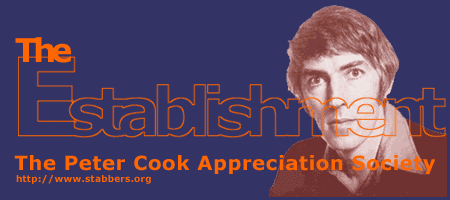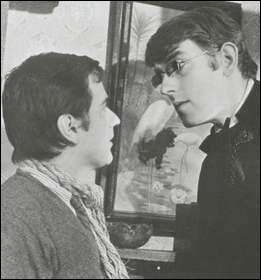|
As 1964 drew to a close, Cook's main professional
activity, outside Private Eye, was his long-awaited, if rather low-key,
breakthrough on television. Aside from two one-off television appearances,
one in a televised version of Beyond The Fringe (1964 BBC2),
and one on American television with John Bird What's Going On
Here? (1963 NBC), and a couple of guest spots, Cook's first
regular work took his oldest creation, now rechristened E.L. Wisty,
to the nation in ATV's On The Braden Beat (1964). Wisty would
give short monologues, mainly extolling the virtues of his World
Domination League, which he had formed with his unseen friend, Spotty
Muldoon [See P&B #12,17,18].
The character was a hit, but was not quite high profile enough to
make Cook the success he could have hoped for.
Meanwhile the BBC had shown an interest in Dudley
Moore as a solo star and, based around his comedic ability and musical
talent, decided to make a pilot show around him with some musical
and comedy guests. Moore asked Cook to come along to do a couple
of sketches with him with a possible view to him being a resident
guest on the show. The pilot, directed by Joe McGrath, turned out
to be everything the BBC had hoped for, and the two sketches performed
by Cook and Moore were such a success that it was decided to commission
a further series of six, this time based on Cook and Moore as a
double act with McGrath directing. The show was called Not Only...
But Also, and the two sketches were based around already existing
Cook characters - one around a Sir Arthur Greeb-Streebling, an upper-class
idiot who had wasted his life trying to teach ravens to fly underwater
with Moore in the straight interviewers role, and another where
what was effectively two E.L. Wistys swapped fantasies where they
were pursued day and night by '50s Hollywood temptresses. In the
latter sketch the two characters were titled Pete and Dud and their
conversations, later called The Dagenham Dialogues, became
the most popular items of the series.
As the characters of Pete and Dud developed their
relationship, with Pete as the pseudo-informed idiot and Dud as
the uninformed idiot who swallowed whatever rubbish Pete came out
with, they proved to be one of the funniest double acts of all time.
Part of their attraction was Cook and Moore's attempt to make each
other laugh on set by deliberately improvising new jokes or inserting
prepared ones that the other didn't know about. Interestingly the
double act of Cook and Moore, as exemplified by The Dagenham
Dialogues, broke the convention of the straight man/ funny man
routine which was considered standard, such as Arthur Haynes and
Nicholas Parsons or Morcambe and Wise, and replaced it with a master/
subordinate relationship. Both men were funny, with Pete as the
assured, dominant half of the act and Dud as the submissive, more
childlike half - a stylistic innovation that can clearly be seen
reflected in many more recent double acts, such as Mel Smith and
Griff Rhys Jones, Rob Newman And David Baddiel, or Stewart Lee and
Richard Herring.
The first series of Not Only... But Also
aired on BBC2 from January-April 1965 and was repeated in May on
BBC1, and was a huge success. The next project for Cook and Moore
was an appearance as the Finsbury brothers in Bryan Forbes's comedy
movie The Wrong Box (1966). The second series of Not Only...
But Also was transmitted January-February 1966 on BBC2, this
time produced by Dick Clement [See
P&B #17], and was as well received as the first series
had been. This was followed by an appearence in Jonathan Miller's
television adaptation of Alice In Wonderland (1966 BBC2)
as The Mad Hatter, and a Not Only... But Also Christmas Special
(1966 BBC2).
After an uncharacteristically long break from the
public eye, Cook and Moore made their break as a starring movie
double act in Bedazzled (December 1967). The film, based
on the Faust legend, concerned Stanley Moon (Moore), who works in
a burger-bar and is besotted with a waitress there, Margaret (Eleanor
Bron), but cannot bring himself to tell her. In a fit of despair
he decides to kill himself but is stopped just in time by the devil
(Cook), or George Spiggott as he calls himself. In return for Moon's
immortal soul Spiggott promises Moon seven wishes which he can use
to try to gain Margaret's love. Moon agrees but with each wish me
makes Spiggott finds a way of thwarting him in all his endeavours,
save that of getting an ice cream. The film, scripted by Cook alone
and directed by Stanley Donan, who previously directed Singin'
In The Rain, is one of the most marvellous comedy films ever
made and is required watching for all human people.
Unfortunately the film did poorly at the British
box office and was generally regarded, commercially at least, as
a flop. The consensus was that the film had confused the British
public's expectations, who had presumably expected an hour-and-a-half
long Dagenham Dialogue rather than a complex and sophisticated comedy
about love, theology and popular culture.
The next few years saw Cook try his hand several
times at the film world, appearing solo in a straight, minor role
in A Dandy In Aspic (1968), a spy movie, then two more minor
roles with Moore, firstly in Richard Lester's film of Spike Milligan
and John Antrobus's stage play The Bedsitting Room (1969),
and then in Monte Carlo Or Bust (1969). Cook then starred
in his own again in the title role in The Rise And Rise Of Michael
Rimmer (1970), Cook rewriting John Cleese and Graham Chapman's
original script. Alas none of the films were great successes, critical
or commercial, and the cinema was to remain the one area Cook could
never conquer.
Meanwhile, on television, Cook and Moore left the
BBC temporarily for Lew Grade's ATV to make a series of three one-hour
specials called Goodbye Again (August-September 1968) [for
broadcast details see P&B #14], with another one-off
special the following year, produced by Shaun O'Rhiordan. Response
to the series was generally that it was not up to the standard of
their work with the BBC, criticism that must have struck home as
their next move was to go back to the BBC to produce another series
of Not Only... But Also (February-May 1970), which was to
prove to be the last. Directed by Jimmy Gilbert, and now in colour,
the new series attempted to be a tad less 'obvious' than the previous
two, a bit more experimental, and viewers could not fail to notice
that Moore was now starting to get out from under Cook's domineering
persona and establish himself more strongly within the double act,
both as a performer and writer. The critical response was more muted
than it had been for the previous BBC series, with the feeling that
Cook and Moore had somehow broken a winning formula, but then again
any series that has a sketch in it like The Making Of A Movie
is worth its weight in gold so what the fuck do critics know? [for
broadcast details of all three series see P&B #12,13,17]
The final chapter in the Not Only But Also saga
came with two shows made in Australia (Feb 1971 ABC, Jun 1971 BBC1)
[see P&B#24],
a mixture of old and new material. Cook now decided that he had,
for the moment, had enough of Not Only... But Also and, more
specifically, with his double act with Moore. The indifferent reception
accorded to The Rise And Rise Of Michael Rimmer had put him
off movies as the next step in his career, so he decided to return
to British television, on his own, to host a show that would be
a mixture of sketches and a chat show, with himself as host. The
show was called Where Do I Sit? (February-March 1971) and
was a total disaster. Cook found it hard to take any interest in
his guests, the sketches seemed designed purely to provoke outrage
rather than be funny and, worst of all, Cook tried to sing. The
show was pulled after only three weeks [See P&B #13,
21].
Partly to escape the embarrassment of this failure,
the first one of significance in his career, Cook agreed to re-unite
with Moore for a single TV play, An Apple A Day, written
by John Antrobus (July 1971 BBC1). Meanwhile, the last Not Only...
But Also specials had been such a success in Australia that
Cook and Moore were offered a five-month stage tour of Australia
and New Zealand, which they called Behind The Fridge (1971-72),
with all new material. The show consisted of some wonderfully dark
sketches, including Mini Drama, a complete departure for
Cook and Moore, a conversation between an apparently homicidal taxi-driver
and his panic stricken fare. If anyone tells you stuff like Blue
Jam is new, play them that.
Cook returned to London to make another solo appearance
in an undistinguished film, The Adventures Of Barry McKenzie
(1972), and a single TV play called Mill Hill (1972 BBC2),
by John Mortimer. Cook's career looked adrift and his drinking was
beginning to effect his professional life. Part of the reason for
his increased alcohol intake at this time may have been the long
term breakdown of his first marriage. His life with Wendy was effectively
over and he had long since publicly declared his girlfriend Judy
Huxtable to be his new partner, but Cook remained devoted to his
two daughters by Wendy, Lucy and Daisy, and the long absences from
home while on tour, along with the acrimonious state of relations
with their mother, meant he saw little of them. This, compounded
with his floundering career, seeming to cover the same old ground
over and over again, saw Cook resorting more and more to the bottle.
Behind The Fridge began its London run at
The Cambridge Theatre (1972-73), under the direction of Joe McGrath.
Reviews were lukewarm-to-cold and relations between Cook and Moore
began to breakdown as Cook's on-stage drinking became more obvious.
The show then transferred to America under the title Good Evening
(1973-75), opening in Boston, then moving to New York where it stayed
before launching a full tour of the US and was, in comparison to
the London run, a huge success. Some of the material from the original
show was considered too parochial for an American audience, so it
was decided to drop certain sketches in favour of older ones like
One Leg Too Few. Peter and Judy were married in New York
in 1974.
By the end of the run of Good Evening, Cook
and Moore's partnership was nearing breaking point. When the time
came for the show to end, Cook returned home to his new home in
Perrin's Walk, Hampstead, which he had bought in 1973, and Moore
decided that he would stay in America and go to Hollywood to try
to make it as a film star on his own. Cook returned to England with
the comic partnership that had brought him mainstream success, to
all intents and purposes, over, only for it to later re-emerge in
the strange mutated form of Derek & Clive.
go to
part three
|


